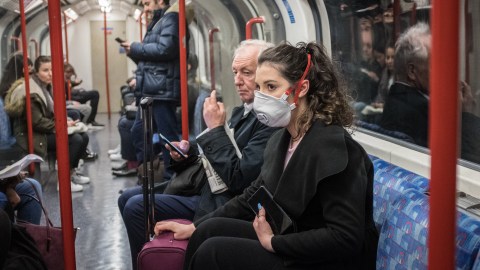To prevent coronavirus don’t touch your face – but how can you avoid it?

S.C. Leung/SOPA Images/LightRocket via Getty Images
In the fight against the new coronavirus there’s one simple measure we can all take but that to many of us may sound almost impossible – we need to stop touching our faces.
- Stop touching your face to reduce your chances of catching coronavirus, experts say.
- Tactics include wearing woolly gloves and an app that sounds a warning if your hand moves to your face.
- But face-touching is an instinctive response to stress and a hard habit to break.
The World Health Organization (WHO) says we should particularly try to avoid touching the eyes, nose and mouth, which can be an effective way of halting the spread of diseases. Viruses can live for days on surfaces from desktops to door handles, and once on our hands can be transferred into our bodies through these entry points.
Hands off: How to stop touching your face
Is there anything we can do to help us give up this habit?
A new web-based app, donottouchyourface.com, uses artificial intelligence to help people avoid touching their faces. Via a webcam, it learns the user’s behaviour patterns and sounds a warning if their hand strays to their face.
Dr Will Sawyer, a family doctor from Ohio, has created Henry the Hand, a website to encourage children to stay safe by avoiding the T-zone – eyes, nose and mouth – where the body’s mucous membranes are vulnerable to infection.
Other experts have suggested wearing woolly gloves to make the sensation of face-touching unpleasant, although gloves may harbour the virus too.
Regular hand-washing and using a 70%-alcohol hand sanitiser can also help reduce the chances of having the virus on your fingers.
You probably don’t realize how often you touch your face
For most of us, keeping our hands away from our faces may require a lot of willpower.
Academics in New South Wales, Australia, who trained a camera on students during a lecture, discovered their hands found their way unconsciously to their faces an average of 23 times an hour.
Another study of office workers showed they averaged 15.7 face touches per hour. By calculating how much virus might be on each person’s hands, the researchers were able to confirm that the touching posed a serious risk of disease transmission.

A recent study found that, for most people, face-touching is a way of coping with stress, regulating emotions and stimulating memory. Researchers have established it’s an instinct we share with monkeys and apes. Gorillas, orangutans and chimpanzees all exhibit similar face-touching behaviour.
Reprinted with permission of the World Economic Forum. Read the original article.





